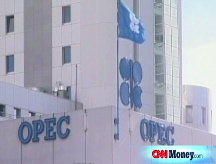OPEC's tough fight: Cheap oil
The cartel will soon be reminded just how hard it can be to control oil prices during a global economic slowdown.
NEW YORK (CNNMoney.com) -- When the Organization of Petroleum Exporting Countries meets at its Vienna headquarters on Friday it will be reminded of just how slippery the price of oil can be, and how little control the cartel has over its price.
Faced with a the possibility of a global recession and a sharp decline in energy demand, OPEC will discuss slashing oil production in an emergency meeting.
OPEC president Chakib Khelil, Algeria's oil minister, said there could be a "significant" reduction in the organization's daily output of 29 million barrels.
The organization considers the market to be oversupplied by two million barrels a day, but it has yet to agree on the size of the cut. This lack of agreement could hinder its efforts to control prices.
"Two million barrels a day is a very big number and it's not that easy to do," said Joseph Stanislaw, an energy expert and independent senior advisor at the consultancy Deloitte & Touche. "It's possible. It's doable. But the question is how long it takes them to agree."
Stanislaw said it's impossible to predict whether a production cut would actually stop the price plunge, given the severity of the economic crisis and the volatility in international markets.
"OPEC's challenge is the challenge that the entire world is facing: all previous rationales of what makes prices go up or down are all up for grabs," said Stanislaw. "No one knows how to establish a value anymore."
Khelil told Dow Jones reporters on Wednesday that non-OPEC members would go along with the cut.
A recent statement from Deputy Prime Minister Igor Sechin of Russia - a non-OPEC nation vying for the top-producer title from Saudi Arabia - said on Wednesday that his country would set aside oil reserves in an attempt to control prices. But he said it would not cut production.
Manouchehr Takin, an analyst at the Center for Global Energy Studies, said a production cut probably would drive down prices, at least in the short term. But Takin added that oil prices are difficult to project because they are influenced by fluctuations in the international markets. But for the near future, he expects demand to continue to weaken.
"There will be even less demand in the coming months because the weakening in the global economy will continue," said Takin.
Prices jumped by $2.80 to $74.25 a barrel on Monday, as investors first weighed a potential supply cut from OPEC. But these gains soon disappeared as investors bet that OPEC wouldn't be able to control prices through cuts.
On Monday Deutsche Bank lowered its 2009 oil price forecast by $25 a barrel, to $60, saying the price could bottom out at $50, "We believe OPEC production cuts are inevitable in this environment, but the experience of 1998 and 2001 suggests the cartel will struggle to cut production as fast as world growth is slowing," the bank said.
Oil was trading at about $68 a barrel on Wednesday. That's less than half its summertime peak of $147.27, which was reached on July 11, 2008.
Oil prices are the lifeblood of the 13 member-nations of the Organization of Petroleum Exporting Countries, which produces 40% of the world's oil supply and holds three-quarters of the proven reserves. Slumping prices can be alarming to influential OPEC members, such as its biggest producer, Saudi Arabia, where oil revenues are feeding a construction boom.
"Most [OPEC] members have planned massive infrastructure projects on the assumption that high oil prices will continue," wrote Anas Alhajji, chief economist for NGP Energy Capital Management, in an email to CNNMoney.com. "If they cut production in the current environment, revenues will decline and they might not be able to finish these projects."
One of OPEC's biggest hurdles as it tries to stem the fall in oil prices is getting all its members to agree to a plan and to stick to it, said Alhajji.
"The final result depends on the size of the Saudi cut in the face of cheating by other OPEC members," said Alhajji. He said OPEC's prospects for boosting the price of oil are doubtful. "It seems that all they can hope for is to halt the decline in oil prices." ![]()


